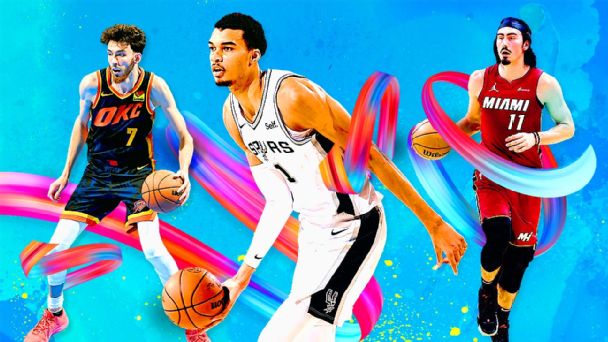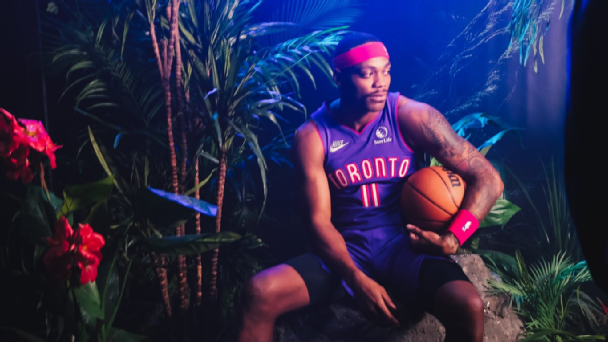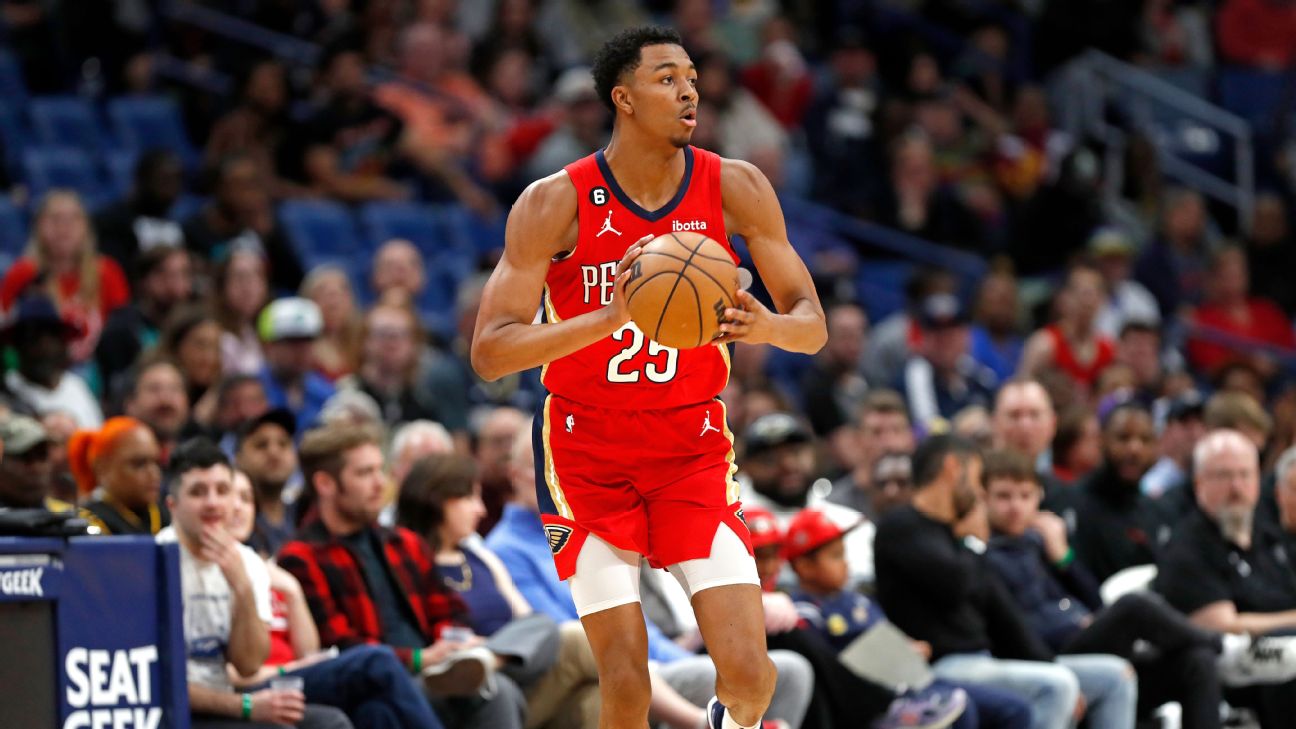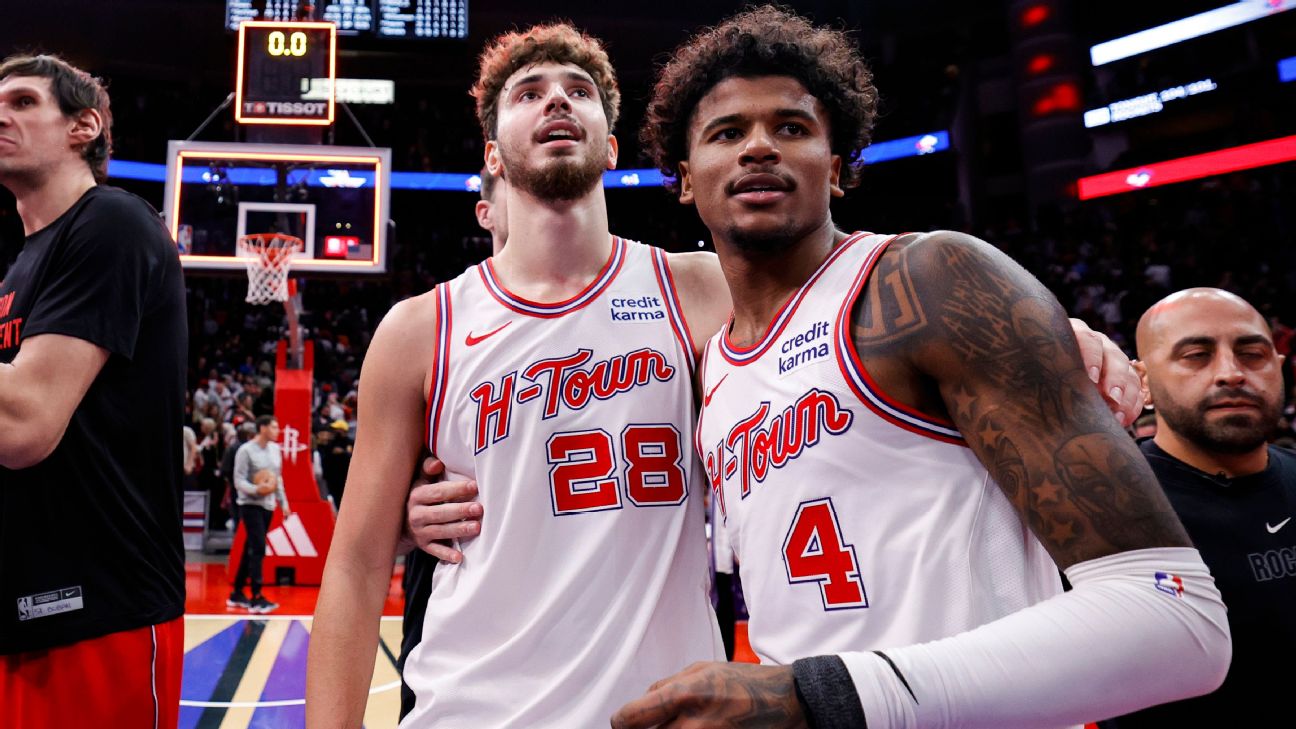ESPN Illustration
We’re at the midpoint of the NBA season, which is typically when we hear about players starting to hit the fabled “rookie wall.” However, the stars at the top of this year’s rookie class show no signs of slowing down. Victor Wembanyama, the No. 1 pick in the 2023 draft, recently recorded his first career triple-double, needing just 21 minutes of game action to do so. Chet Holmgren, the No. 2 pick in the 2022 draft, is shooting 71.4% over his past three games, all Thunder wins. And they’re not the only rookies making noise in January.
All season, ESPN’s Bobby Marks and Kevin Pelton will be checking in on first-year players — including Holmgren, who is eligible for Rookie of the Year after missing his first season in the NBA due to injury — and ranking their top 10.
Let’s break down what we’ve seen from the rookies.

1.
Marks: Chet Holmgren, Oklahoma City Thunder
Holmgren not only has strong midseason credentials for Rookie of the Year, but he is making the case to play in Indianapolis in next month’s All-Star Game. He also could see his name on an All-Defensive Team. Not since Tim Duncan in 1998 has a rookie recorded seven or more blocks in consecutive games. Holmgren accomplished that in mid-December in wins against Denver and Memphis. Holmgren is not just feasting on teams at the bottom of the standings; he’s also putting up numbers against teams with top-10 records. Since Dec. 15, Holmgren has a 67.2% effective field goal percentage, third best in the NBA among players to take 150 shots during that span, trailing only Denver’s Nikola Jokic (71.6%) and Sacramento’s Domantas Sabonis (68.0%). Holmgren has shot 78% on layups and dunks since Dec. 15, best in the NBA among players with at least 80 attempts, per Second Spectrum tracking.
Pelton: Holmgren
As you note, Bobby, Holmgren only seems to be getting stronger offensively as the season goes on. Actually being the first rookie All-Star since Blake Griffin in 2011 — in his second year as a pro after a full season missed due to injury, like Holmgren — could be a challenge, given he’s competing with established All-Stars such as De’Aaron Fox, Paul George, James Harden, Lauri Markkanen and Domantas Sabonis for a spot. Still, Holmgren has played his way into that discussion and was one of my picks last month based only on performance to date.
2.
Marks: Victor Wembanyama, San Antonio Spurs
There are so many hypotheticals to ask when wondering about Wembanyama’s case for Rookie of the Year. What if he was playing in Oklahoma City instead of Holmgren? How much does the Spurs’ dismal record sway voters in comparison to a Thunder team that is top three in the Western Conference? (Full disclosure: I do not have a vote.) Does Wembanyama’s minutes restriction and the Spurs’ cautious approach in back-to-back games come into play? Wembanyama would be the Rookie of the Year favorite if Holmgren was not eligible. Since he began starting at center on Dec. 8, Wembanyama is averaging 20.5 points, 11.1 rebounds and 3.9 blocks in just 26.6 minutes per game. He has scored 190 points in 193 minutes over his past seven games. That 0.99 points per minute is the best by any rookie over a eight-game span (minimum 150 minutes played).
Pelton: Wembanyama
The other element to the Rookie of the Year race is Wembanyama’s bad fortune coming up against Holmgren. Wembanyama is on pace for the most wins above replacement player (WARP) by my metric for a rookie since Dallas’ Luka Doncic in 2018-19. It just so happens that Holmgren is on an even better pace, although the gap is closing to a degree. Despite Wembanyama’s minutes limit, he has contributed an estimated 1.4 WARP since our last update as compared to 1.5 for Holmgren.
3.
Marks: Jaime Jaquez Jr., Miami Heat
There were concerns from me that the Heat forward was starting to hit the proverbial rookie wall in the two games on Dec. 16 and 18. Jaquez was 6-for-18 from the field, going 0-of-4 from deep. He bounced back on Christmas Day with a career-high 31-point, 10-rebound game against the Philadelphia 76ers. He became the fifth rookie to have 30 points and 10 rebounds in a Christmas Day game, joining Patrick Ewing, Walt Bellamy, Oscar Robertson and Wilt Chamberlain. We haven’t even hit the All-Star break, but Jaquez already has played more games (39) than he played all of his senior year at UCLA (37). Jaquez also leads the NBA in fourth-quarter minutes played.
Pelton: Jaquez Jr.
That fourth-quarter stat jumped out at me when I first heard it on a broadcast. It’s more a product of Jaquez almost always being on the court at the start of fourth quarters than playing clutch minutes per se — he has played about 60% of Miami’s clutch time, per analysis of data from NBA Advanced Stats. That’s still remarkable for a rookie on a team that reached the Finals seven months ago. Jaquez has earned Erik Spoelstra’s trust by being rock solid at both ends from day one.
4.
Marks: Dereck Lively II, Dallas Mavericks
Since the last rankings came out, Lively has missed seven games due to a left ankle injury. But because we look at the whole body of work from when the season started, and not just the past four weeks, it is hard to move Lively out of the top four. In the games he missed, Dallas went 4-5 and gave up an average of 118 points in its losses. For the season, Per Cleaning the Glass, Lively ranks in the 90th percentile at his position in shots made at the rim and in midrange. He ranks fifth among all players in contested shots per game as well.
Pelton: Lively
It’s not just the games Lively has missed. Overall this season, the Mavericks have performed 7.6 points per 100 possessions worse with Lively on the bench — a bigger drop-off than Dallas sees without Doncic and Kyrie Irving, per NBA Advanced Stats. That difference hasn’t been built on fluky opponent shooting, as teams are shooting a better percentage against Dallas from 3-point range when Lively plays.
5.
Marks: Brandin Podziemski, Golden State Warriors
Minutes after submitting my rankings in December, Podziemski took a game-saving charge in a win at the Portland Trail Blazers. He followed that up by hitting two clutch free throws. For the season, Podziemski ranks third in charges taken per game and fourth in total charges taken. The Warriors went 5-3 in the games Podziemski started in December, but coach Steve Kerr moved him back to the bench after consecutive losses to Denver and Miami. What I like about Podziemski is that he provides value even if he is not making shots. In the two blowout losses to Toronto and New Orleans, Podziemski shot 3-of-17 from the field but still managed to grab 17 rebounds (five offensive) and hand out six assists. From Nov. 30 through Jan. 5, Podziemski shot 45.5% from 3-point range, though he’s just 4-of-22 in his past five games.
Pelton: Podziemski
Podziemski’s performance is all the more notable given the difficulty for rookies to be efficient perimeter scorers. As a group, this year’s rookie shooting guards have posted a .542 true shooting percentage. Last year, that mark was .524. Podziemski is beating that at .549 in addition to the other contributions Bobby detailed.
6.
Marks: Cason Wallace, Oklahoma City Thunder
Wallace’s blistering shooting was destined to cool off. In the first 22 games, the Oklahoma City guard shot 52% from deep. A stretch of games from Dec. 18 to Dec. 29 saw him make only three out of 18 attempts. He is still shooting 39.4% on 3-pointers, first among all qualified rookies.
Pelton: Wallace
As Bobby noted, there was no chance Wallace was going to stay so hot from 3, which was driving much of his value as of our last update. Even 39% 3-point shooting may be difficult for Wallace to maintain, but his defense and secondary playmaking are more durable contributions. Wallace’s minutes haven’t dropped during his shooting slump, as he averages 21.4 MPG for a surprise contender.
7.
Marks: Duop Reath, Portland Trail Blazers
Rarely does a 27-year-old player crack the rookie rankings. Reath is one of the great stories this season. After going undrafted out of LSU, he bounced around to the Mavericks, Nets, Suns and eventually the Trail Blazers in summer league. In between were stops in Serbia, Australia and Beirut. Signed by Portland on a two-way contract, Reath is averaging 18.6 points and 8.1 rebounds per 36 minutes. With Deandre Ayton out of the lineup because of a right knee injury, Reath is averaging 11.5 points and 6.4 rebounds as a starter. In the past 15 games, Reath ranks second in offensive rebounding among all rookies.
Pelton: Trayce Jackson-Davis, Golden State Warriors
The other rookie helping keep the Warriors afloat, Jackson-Davis has supplied valuable above-the-rim finishing and rim protection to a Golden State frontcourt lacking in those traits. Per Basketball-Reference.com, Jackson-Davis’ 43 dunks in just 433 minutes are more than double any Warriors teammate save Jonathan Kuminga. And Jackson-Davis leads the team in that limited action with 25 blocks, earning him a handful of recent starting assignments.
8.
Marks: Jackson-Davis
Golden State paid $2 million to Washington the night of the draft for the rights to Jackson-Davis. He only played two summer league games but averaged 16 points, 8.5 rebounds and shot 66.7% from the field. He was inactive or did not play in 10 games before Steve Kerr inserted him into the rotation on Dec. 17. He ranks behind only Wembanyama in rebounds per game among rookies since mid-December.
Pelton: Ausar Thompson, Detroit Pistons
Having started at the beginning of the season, Thompson now finds himself on the fringes of Monty Williams’ rotation — ahead of fellow rookie Marcus Sasser — in part because the Pistons need more shooting than he can provide. Still, Williams shouldn’t ignore the value of Thompson’s disruptive defense. Even in reduced playing time, Thompson is averaging nearly a steal and a block per game.
9.
Marks: Ausar Thompson
Thompson has averaged 17.1 minutes (21st among all rookies) since Dec. 17 but it is hard for me to ignore what he accomplished in the first six weeks of the season. Thompson’s 13 steals and 19 blocks in the first 10 games were the most since Marcus Camby in 1996-97. He ranked second in offensive rebounds and was the first player with 40 offensive rebounds through 10 career games since Elton Brand in 1999-2000, per ESPN Stats & Information. Per Cleaning the Glass, Thompson still ranks in the 96th percentile in blocks and rebounding among players at his position.
Pelton: Craig Porter Jr., Cleveland Cavaliers
Another undrafted rookie cracking the rankings, Porter has played key minutes with the retirement of Ricky Rubio and injuries to Darius Garland and Ty Jerome leaving Cleveland thin at the point. Porter is more of a volume scorer than an efficient one, but his 2.9 assist-to-turnover ratio is strong and his improbable shot-blocking for a 6-foot-2 guard has carried over from Wichita State. Porter, who averaged 1.5 blocks per game last season, is averaging 1.1 per 36 minutes in the NBA. With Rubio’s buyout complete, the Cavaliers will need to fill their 14th roster spot soon, and promoting Porter from a two-way contract is the logical solution.
10.
Marks: Scoot Henderson, Portland Trail Blazers
Henderson became only the sixth rookie in NBA history to record at least 33 points, seven rebounds, nine assists and three steals Sunday night. However, turnovers continue to be a problem for Henderson, who leads all rookies in turnovers per game (3.3) and opponents’ points off turnovers (11.8) when he is on the court. One of the strengths of Henderson coming into the league was his ability to finish at the rim. So far, Henderson is shooting 41% on layups and 40% on shots less than five feet. Since Dec. 15, 118 players have attempted at least 50 layups and dunks. Henderson is last among that group in field goal percentage on those attempts, shooting 38.0%. Immanuel Quickley is the next worst player in that span at 42.3%.
Pelton: Jordan Hawkins, New Orleans Pelicans
With the Pelicans rolling since their loss during the in-season tournament semifinals, minutes have been scarce for Hawkins. When given the opportunity, he continues to perform well, putting up 26 points on 10-of-18 shooting (5-of-10 from 3-point range) in back-to-back blowout wins in northern California last week.
More rookie notes:
-
Cam Whitmore’s rookie year has been a roller coaster. He slid to 20th on draft night and played in just five of the Houston Rockets’ first 17 games, shooting 46.7% from the field and 20% from 3. Whitmore was sent to the G League, where he lit it up for Rio Grande, averaging 26.2 points while shooting 38.9% from 3. Whitmore has scored double-digit points in seven out of nine games since he was recalled by the Rockets following the G-League showcase. One area of improvement from his freshman year at Villanova has been his range from deep. He has shot 42.4% from 3 since Dec. 22 after going 34.3% on 3-pointers last year.
-
Since Dec. 17, Brandon Miller is averaging 1.8 free throws per game (15th among all rookies) and 2.4 per 36 minutes. In the past month, Miller ranked outside of the top 30 among all rookies in effective field goal percentage (45.0%). Since Dec. 15, Miller has shot 36% on layups, dunks and floaters, the second-worst during that span among players with at least 50 attempts.
-
A pair of point guards, Orlando’s Anthony Black and Utah’s Keyonte George, were starters at one time before moving to the bench. Black started 28 games before going into a reserve role on Jan. 7. In Orlando’s Dec. 26 win against Washington, Black scored a career-high 23 points, 6 rebounds and 4 assists. George started 16 games for Utah but was moved to the bench after he returned from a sprained ankle. He had a 19-point, 6-rebound, 4-assist game in a January win against the Milwaukee Bucks.



